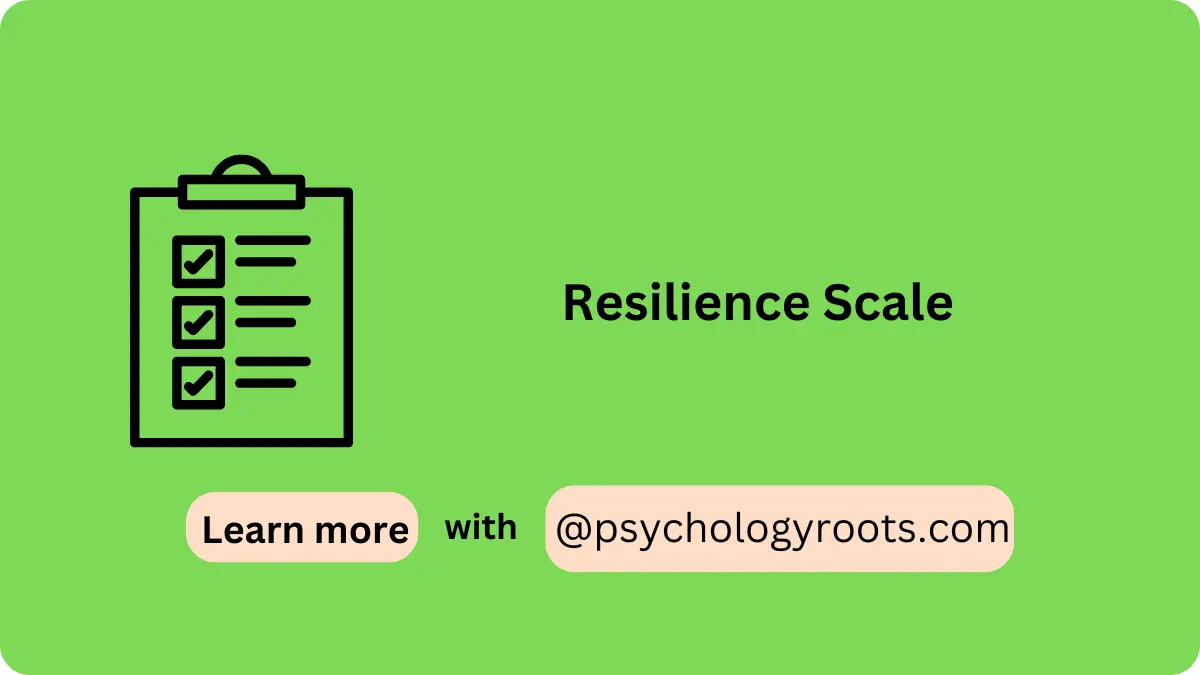Table of Contents
Resilience Scale
Here in this post, we are sharing the “Resilience Scale”. You can read psychometric and Author information. We have thousands of Scales and questionnaires in our collection (See Scales and Questionnaires). You can demand us any scale and questionnaires related to psychology through our community, and we will provide you with a short time. Keep visiting Psychology Roots.
About Resilience Scale
Scale Name
Resilience Scale
Author Details
James T. Neill (james.neill@cisunix.unh.edu) and Katica L. Dias
Translation Availability
English

Background/Description
The Resilience Scale is designed to measure an individual’s ability to effectively cope with and respond to life stressors. Resilience encompasses various domains, such as planning, critical thinking, and independence. This tool is particularly focused on young individuals aged 12–18 years, assessing their capacity to handle challenges and maintain psychological well-being.
With 25 items rated on a 7-point Likert scale, the Resilience Scale delves into specific aspects of resilience, offering valuable insights for both research and intervention purposes. Its high reliability and straightforward scoring process make it a robust tool for evaluating resilience in adolescents.
Administration, Scoring and Interpretation
- Target Population: Adolescents aged 12–18 years (Grades 6–12).
- Format: Self-report questionnaire with 25 items.
- Instructions: Participants indicate their level of agreement with each statement on a scale from 1 (Disagree) to 7 (Agree).
- Duration: 10–15 minutes to complete.
- Environment: Conduct in a quiet and private setting to facilitate accurate and thoughtful responses.
- Scoring:
- No items require reverse coding.
- Responses for all 25 items are summed to generate a total resilience score.
- Higher scores indicate greater levels of resilience.
Reliability and Validity
- Reliability: Cronbach’s alpha = 0.91, indicating excellent internal consistency.
- Validity: The scale demonstrates robust construct and criterion validity, making it effective in assessing resilience across diverse adolescent populations.
Available Versions
25-Items
Reference
Neill, J. T., & Dias, K. L. (2001). Adventure education and resilience: The double-edged sword. Journal of Adventure Education and Outdoor Learning, 1(2), 35–42. https://doi.org/10.1080/14729670185200061
Important Link
Scale File:
Frequently Asked Questions
Q1: What does the Resilience Scale measure?
It measures various components of resilience, such as planning, independence, and the ability to handle stress.
Q2: Who is the target audience for the Resilience Scale?
It is designed for adolescents aged 12–18 years (Grades 6–12).
Q3: How is the scale scored?
Participants’ responses to the 25 items are summed, with higher scores reflecting greater resilience.
Q4: Is reverse scoring required for any items?
No, none of the items require reverse coding.
Q5: Can the Resilience Scale be used without permission?
Yes, permission is not required to use this scale.
Disclaimer
Please note that Psychology Roots does not have the right to grant permission for the use of any psychological scales or assessments listed on its website. To use any scale or assessment, you must obtain permission directly from the author or translator of the tool. Psychology Roots provides information about various tools and their administration procedures, but it is your responsibility to obtain proper permissions before using any scale or assessment. If you need further information about an author’s contact details, please submit a query to the Psychology Roots team.
Help Us Improve This Article
Have you discovered an inaccuracy? We put out great effort to give accurate and scientifically trustworthy information to our readers. Please notify us if you discover any typographical or grammatical errors.
Make a comment. We acknowledge and appreciate your efforts.
Share With Us
If you have any scale or any material related to psychology kindly share it with us at psychologyroots@gmail.com. We help others on behalf of you.